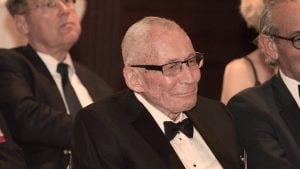Mr. Bandow, a nationally syndicated columnist, is a senior fellow at the Cato Institute and the author and editor of several books, including Tripwire: Korea and U.S. Foreign Policy in a Changed World.
President Bill Clinton has run for public office for the last time. No longer subject to judgment by the voters, he is now accountable only to history, or at least to the historians who write the history books.
Nearly 50 years ago historian Arthur Schlesinger organized a poll of 55 historians to rate America’s presidents. Schlesinger staged a repeat in 1962. Some journalists subsequently conducted their own surveys. Now Schlesinger’s son, writer Arthur Schlesinger, Jr., has organized yet another survey of the historical establishment. The results of all these efforts are predictable. Presidential greatness is defined as action, the more frenetic the better. Which means big government, the more intrusive the better.
Abraham Lincoln tops the list, a unanimous choice for greatness. There’s no doubt that he was a skillful politician and succeeded in his primary goal of preserving the union. But was it worth plunging the nation into a war that killed 620,000 Americans? His predecessor, James Buchanan, is judged to be a failure and indeed Buchanan did much to exacerbate sectional tensions. But he, at least, held back from the fateful step of making war on states that only sought to peacefully depart the union.
Lincoln also began a tradition of subverting constitutional liberties. He unilaterally suspended habeas corpus; his administration jailed political opponents, banned critical newspapers from the mails, and manipulated border state elections. At his urging Congress conscripted men into the army and turned paper money into legal tender. Moreover, the Civil War proved the truth of the adage that war is the health of the state: Abraham Lincoln created the first national government that intimately intruded into the lives of its citizens.
Second in the rankings is Franklin Delano Roosevelt. This president, too, was a political master. His economic policies were a failure, however. The New Deal, as he termed it, might have improved Americans’ morale, but it did not spark a sustained recovery. Now, decades later, we are reaping the bitter harvest of many of his misguided initiatives: deposit insurance, which led to the S&L debacle; Social Security, which is heading over a fiscal cliff; and pervasive government meddling, which has slowed our economy’s growth and reduced our freedom.
Moreover, while his wartime leadership may have been competent, he had a wildly naive view of mass murderer Joseph Stalin. Equally important, Roosevelt maneuvered secretly to drag the United States into the worst war in human history, a decision which deserved to be debated fully by the American people. Finally, he committed perhaps the single greatest violation of civil liberties of any president—the incarceration of over 100,000 Japanese-Americans based on their national origin. Equally grotesque was his administration’s refusal to allow the entry of Jewish refugees even while the Nazis were destroying European Jewry.
The third and last great president is George Washington. He is the only one who deserves that designation, as much for what he did not do as for what he did. President Washington, in contrast to so many of his successors, rejected the opportunity to accumulate power. Nor did he see America’s role as that of an international nanny; to the contrary, he warned against foreign entanglements. He truly believed in individual liberty and republican government.
The near-greats are led by Thomas Jefferson and Andrew Jackson who, like Washington, are good selections. Both had their flaws; the latter favored slavery, for instance. But neither mistook a desire to expand state authority with public-spiritedness. Both inveighed against the use of government to enrich the politically powerful.
Next in line, however, is Woodrow Wilson, a man who pushed the United States into World War I and sacrificed 110,000 lives in his belief that he had been anointed to save mankind. His administration was the most repressive in U.S. history; it persecuted critics of both conscription and the war and inflamed popular hysteria against anyone who demonstrated anything other than enthusiasm for the president’s policies. Wilson even proposed outlawing criticism of the government. He ended his presidency crippled by a stroke but hanging onto power by deceiving the public.
Then comes Theodore Roosevelt. He was a complex and fascinating man, but his appetite for war was probably unmatched by any other president. The specific opponent didn’t matter—over the years he advocated conflict with Britain, Germany, and Spain. Rather, he believed in war as a matter of principle. His view of non-Western peoples was disgraceful. His interventionist economics ultimately made the economy less, not more, competitive.
The next near-great is Harry S. Truman. President Truman is impressive only insofar as he rose above the worst sort of machine politics with a performance adequate to avoid disaster in the dangerous post-World War II era. But his international policies exacerbated the Cold War, yielding the national security state and outsized military that plague us to this day. His mistakes in Korea turned a small regional conflict into a lengthy war with China. Constitutional limits did not deter him, as exhibited by his attempted seizure of the steel industry. His domestic policies were marked by inefficient economic intervention.
The last of the almost-greats is James Knox Polk, an unabashed imperialist. He initiated what was, truth be told, a war of aggression against Mexico that led to the seizure of half of that nation’s territory. He was frugal when it came to economics, but his belief that territorial expansion warranted war was more befitting a twentieth-century dictator. Today we can thank him for the addition of Arizona, California, New Mexico, and Texas; the people subjugated by U.S. troops probably had a different view, however.
In contrast, Dwight Eisenhower, who ended the Korean War, warned against militarism, and moderated domestic federal expenditures, is judged to be merely average. At least he now comes in better than he did in 1962—an embarrassing 22nd out of 31.
Calvin Coolidge, who presided over prosperity and peace, is rated below average. He had no grand initiatives, since there was no cause for grand initiatives. But to establishment historians, leaving the American people alone is considered to be a sign of mediocrity, not greatness.
Warren Harding, whose associates were notoriously corrupt, is termed a failure. But it was Harding who restored civil liberties after the repressive Wilson era. He also kept America aloof from France’s vindictive post-World War I policies and presided over a strong economy. This is a better record than that amassed by most of the supposed greats and near greats.
What will history say of Bill Clinton? It’s too early to tell, though historians obviously like presidents who send the military into action around the globe, propose massive new social programs, and talk endlessly in action-oriented terms.
However, the judgment that matters most will be that of history—as reflected in the actions of millions and billions of people around the globe. Already they have rendered their verdict on the ruthless totalitarians who were venerated as demigods earlier this century. Those dictators’ monuments have been toppled and their memories are now execrated. As what historian Paul Johnson calls the age of politics recedes in America too, many of the great and near-great presidents are likely to find their reputations falling in the same way. Presidents mesmerized by power and willing to sacrifice American lives, wealth, and freedom for social engineering projects at home and abroad will find history, if not historians, to be unkind.




